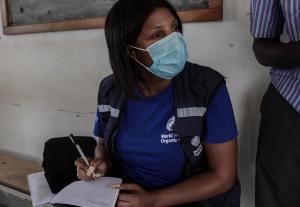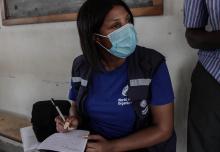Call for increased investments towards mental health services
By Vivian Mugarisi
Harare, Zimbabwe - October 10 marks the Mental Health Day and this year’s commemorations are coming at a time when the world is dealing with the Covid19 pandemic.
The Covid19 pandemic exposed the gaps within many countries’ health care systems, Zimbabwe included, with health experts calling for increased funding towards improving mental health care services.
“We are dealing with a pandemic that exposed, created and unravelled a lot of mental health issues to patients, caregivers, health practitioners literally everyone across the world,” says Dr Sarifice Chirisa, Ministry of Health and Child Care (MoHCC) Mental Health Deputy Director.
“As we commemorate this day we are really pushing now for serious investments into mental health care because we have seen that when it is not taken care of and crisis hit, people are really affected. This year we are really calling for government, private sector to really consider and acknowledge mental health as a priority.
“When you look at mental health programming within Zimbabwe, traditionally like anywhere else in the world, it has been poorly funded over the years. Our psychiatric hospitals are dilapidated, and we have very few specialised cadres,” he said.
Dr Chirisa however said there has been a shift in the manner in which government has been acknowledging the need for investment towards mental health programmes, calling for increased awareness at all levels during this year’s virtual celebrations.
Meanwhile, the World Health Organisation (WHO) is working with governments to review mental health legislation and related policies, to build capacities using the Mental Health Gap Action Programme (MH-Gap), a task sharing strategy where primary health care workers are trained and then supervised in managing common mental disorders.
Zimbabwe is one of the six countries selected to be part of the WHO Director-General’s Special Initiative for Mental Health to strengthen these services. A national assessment of the mental health services was carried out in 2019 and virtual consultations done to develop a plan of action and identify priorities and come up with a framework that respond to the country’s needs.
WHO Country Representative Dr Alex Gasasira said mental health is one of the most neglected condition world over, saying that the mental health day gives Zimbabwe, in particular, an opportunity to raise awareness of actions stakeholders are carrying out to provide quality mental health services to the general public.
“Before Covid-19, mental health was a big burden on our health and now with Covid19 it is much more important that we give mental health the attention it requires,” said Dr Gasasira.
WHO has been supporting the Government of Zimbabwe to strengthen policy and leadership framework for mental health services which saw the development of the new national mental health strategy which will guide the country’s programming from 2019 to 2023.
Over 300 health frontline health workers have been trained with the support from WHO, to be able to detect mental health illnesses timely and provide necessary interventions, while psychosocial support services were provided for after the cyclone Idai hit parts of Manicaland and Masvingo provinces last year.
In her message to mark the day, WHO Regional Director for Africa, Dr Matshidiso Moeti called on governments to invest more towards mental health services to reduce out of pocket payments that have hindered access to care for many.
“The COVID-19 pandemic has brought out more than ever, how mental health is integral to overall well-being. Restrictions on movement and gathering, job losses, deaths of loved ones, and widespread COVID-19 infections have led to fear, anxiety and depression. There are reports of upsurges in intimate partner violence and suicides,” she said.
“This investment is urgently needed. Globally, one in four people will be affected by a mental disorder at some point in their lives, and in the WHO African Region, government expenditure per capita on mental health is less than 10 cents.
“Most mental health services are paid for directly by patients and their carers. For low-income households and other vulnerable groups, the cost of this essential care can cause financial hardship. In working together to attain universal health coverage, we must ensure people affected by mental health issues are not left behind,” said Dr Moeti.
In celebration of World Mental Health Day 2020, this year’s theme is “Move for Mental Health: Let’s Invest” to advocate for increased international and domestic financing for mental health and well-being.

